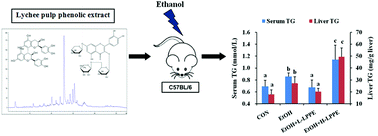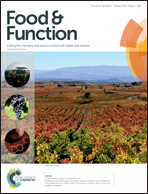The biphasic dose effect of lychee (Litchi chinensis Sonn.) pulp phenolic extract on alcoholic liver disease in mice†
Abstract
Lychee (Litchi chinensis Sonn.), a subtropical fruit grown widely in Southeast Asia, has been used as a traditional Chinese medicine for liver protection. Our previous study showed that phenolics from lychee pulp had hepatoprotective activity against restraint stress-induced liver injury. The present study investigated the protective effects of lychee pulp phenolic extract (LPPE) on ethanol-induced liver injury and the mechanism responsible for these effects. Mice were divided into four groups and subjected to either a control liquid diet (control group, CON), a 4% (w/v) ethanol-containing liquid diet (ethanol group, EtOH), a 4% (w/v) ethanol-containing liquid diet supplemented with 0.4 g L−1 LPPE (low dose LPPE-supplemented group, EtOH + L-LPPE), or a 4% (w/v) ethanol-containing liquid diet supplemented with 0.8 g L−1 LPPE (high dose LPPE-supplemented group, EtOH + H-LPPE) for 8 weeks. The ethanol-induced hepatic steatosis and increases of triglyceride levels in the serum and liver were ameliorated by L-LPPE supplementation but aggravated by H-LPPE supplementation. Moreover, L-LPPE supplementation improved the antioxidant status, reduced the nuclear translocation of nuclear erythroid 2-related factor 2 (Nrf2), and reduced the expression of Nrf2 target genes in the liver. H-LPPE supplementation resulted in the improved antioxidant status and reduced the expression of Nrf2 target genes. Furthermore, L-LPPE suppressed the expression of lipid synthesis genes and increased the expression of fatty acid β-oxidation genes. However, H-LPPE increased the expression of genes responsible for lipid synthesis and uptake and reduced the expression of fatty acid β-oxidation genes. Additionally, L-LPPE supplementation effectively decreased the serum endotoxin level and reversed ethanol-induced alterations in the intestinal microbiota composition. Collectively, LPPE showed biphasic effects on ethanol-induced liver injury in mice, indicating that a moderate intake of LPPE or Litchi pulp could be useful for the prevention and control of alcoholic liver disease.


 Please wait while we load your content...
Please wait while we load your content...